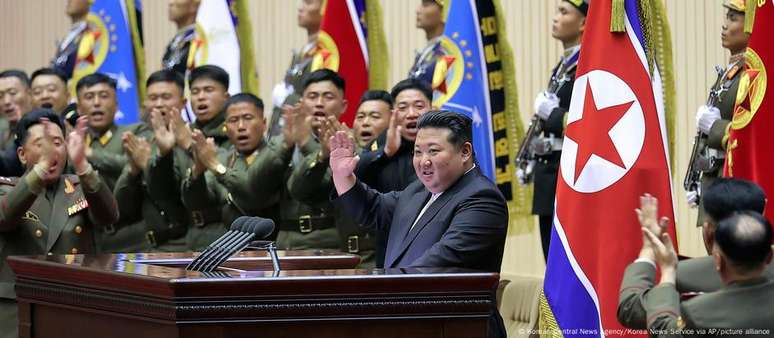For a week the North Korean government remained silent on the martial law and protests against the president of the neighboring country. Experts analyze the possible reasons for the unusual silence. In the week following President Yoon Suk Yeol’s premature announcement of martial law in South Korea, Pyongyang has remained unusually silent. Yoon Suk explained that the measure was necessary due to “anti-state” and “North Korean communist” forces within the national opposition.
The North’s state propaganda machine typically seizes on any hint of public dissent in its sister nation as evidence of the corruption and incompetence degrading its democratic system and leaders. Between the president’s statement on the night of December 3 and this Tuesday (12/10), however, the North ignored the opportunity to mock its ideological rival and underline the superiority of its own model of socialism.
Instead, state news agency KCNA focused on more mundane domestic issues, such as the opening of a condiment factory and the participation of a youth group in a “pledge meeting.”
Some observers have suggested that Pyongyang chose not to show footage of the South Korean population protesting en masse against the government so as not to encourage its own dissatisfied citizens to attempt something similar.
Others believe that the unrest in the South has made the North fear that the pressured Seoul government might try to divert public attention, causing a security incident between the two states. Therefore, Pyongyang would focus its energies on preparing for some kind of confrontation.
End of the “one Korean people” principle?
Yet another theory dates back to North Korea’s announcement in late 2023 that it wanted to amend its Constitution to reflect the South’s status as a “belligerent state,” with bilateral relations now “between two hostile states.” This is a radical departure from the paradigm that the two Koreas are a homogeneous people that will one day be reunited.
Professor of History and International Relations Andrei Lankov, of Kookmin University in Seoul, points out that “almost every weekend since Yoon has been in power, there have been large demonstrations against his government” in the capital. “And every time there was a march, the North Korean media would talk about it. I think that if that wasn’t the case after martial law was declared, it’s partly because the North wanted to see what would happen.”
“But there has also been a gradual reduction in the volume of coverage that the North offers to its citizens in state media, because it does not want to focus its attention on the South, it wants to position it as ‘just another country’,” assesses Lankov.
Goo Gap-woo, professor of Diplomacy at the University of North Korean Studies in Seoul, agrees that Pyongyang is actively pursuing a policy of distancing itself from any kind of contact with its neighbor: “I can only think that this is a further proof that they no longer want anything to do with the South after Kim Jong-un’s “two Koreas” declaration last year.”
“Above all, I think they don’t want to get involved in any conflict on the Korean Peninsula,” Goo reinforces: the military risk may be too high, given the amount of ammunition and soldiers that North Korea has sent to Ukraine to fight the Russian side in war.
Pyongyang finally breaks the silence
In the end, however, the North evidently recognized that it could not remain silent: this Wednesday, in its usual provocative tone, KCNA reported on events in the South.
“The Shocking Incident of Yoon Suk-yeol’s Puppet Regime […]Suddenly declaring martial law and, without hesitation, brandishing the rifles and knives of his fascist dictatorship, he caused chaos throughout South Korea.”
The article described the South Korean military as a “gangster organization”, calling Yoon’s actions “a disaster” and stating that the public would demand his immediate impeachment and punishment. The report was accompanied by about twenty photos, although none showed civilians resisting the military outside the Seoul Parliament.
Source: Terra
Rose James is a Gossipify movie and series reviewer known for her in-depth analysis and unique perspective on the latest releases. With a background in film studies, she provides engaging and informative reviews, and keeps readers up to date with industry trends and emerging talents.







